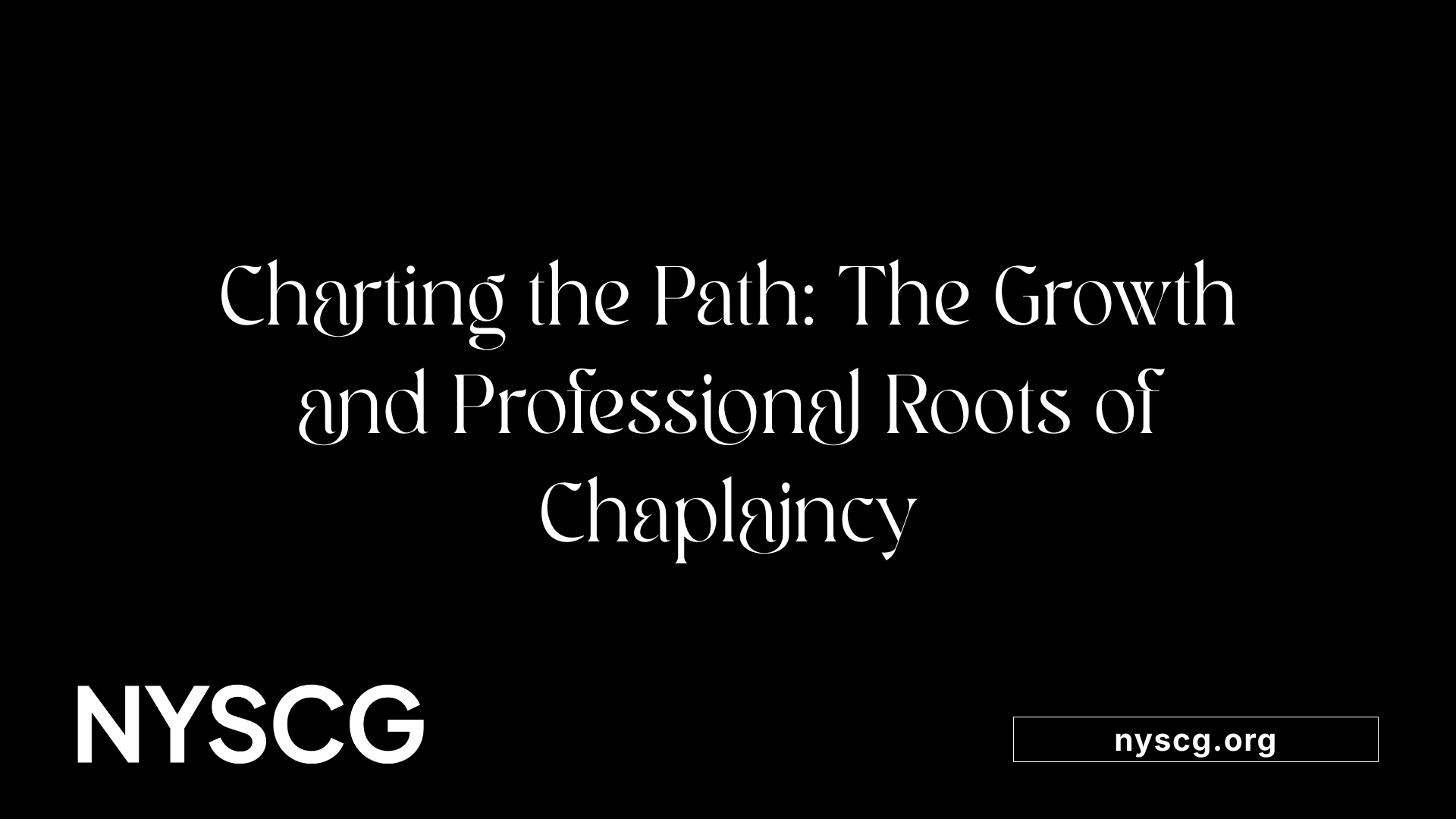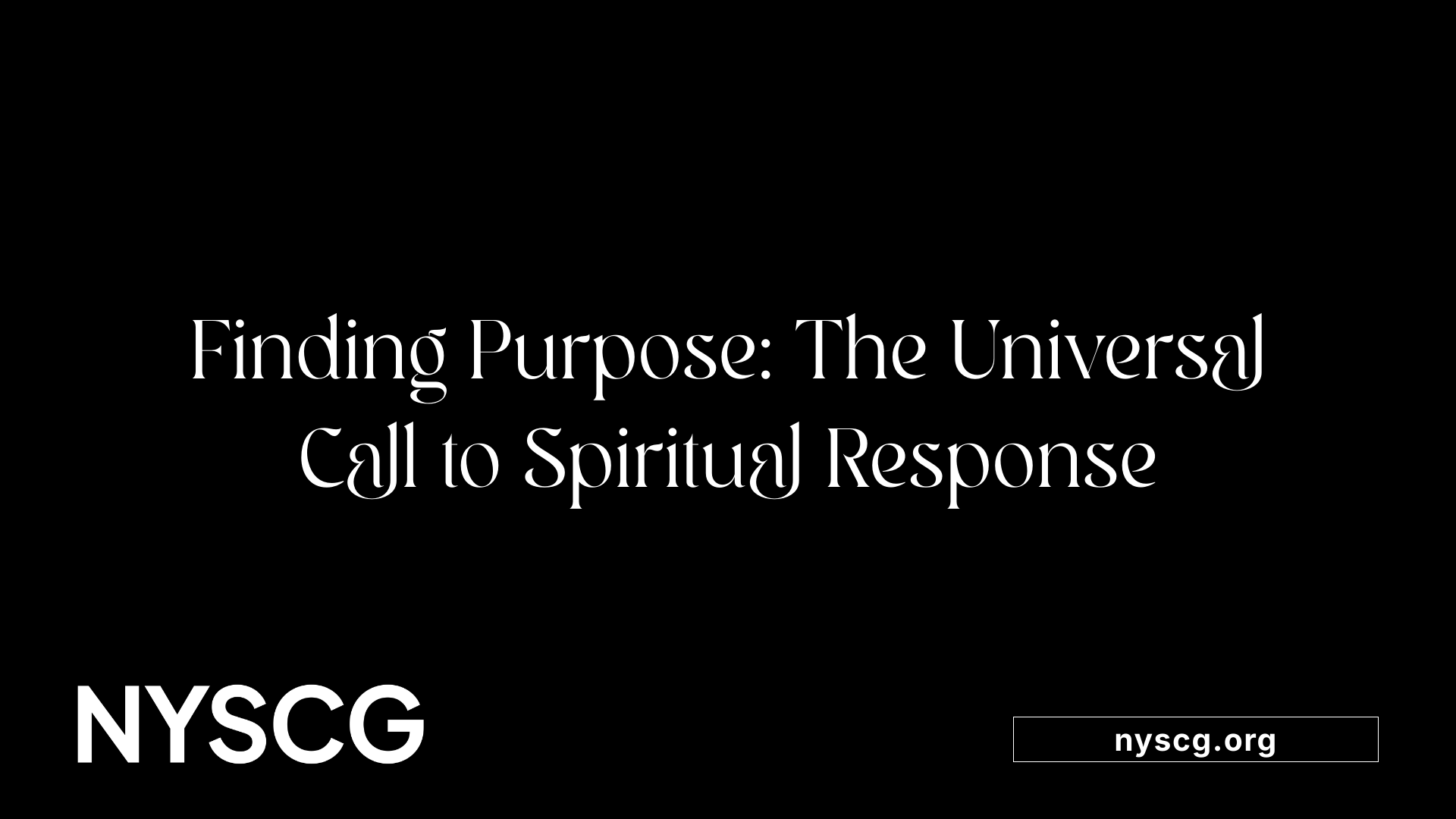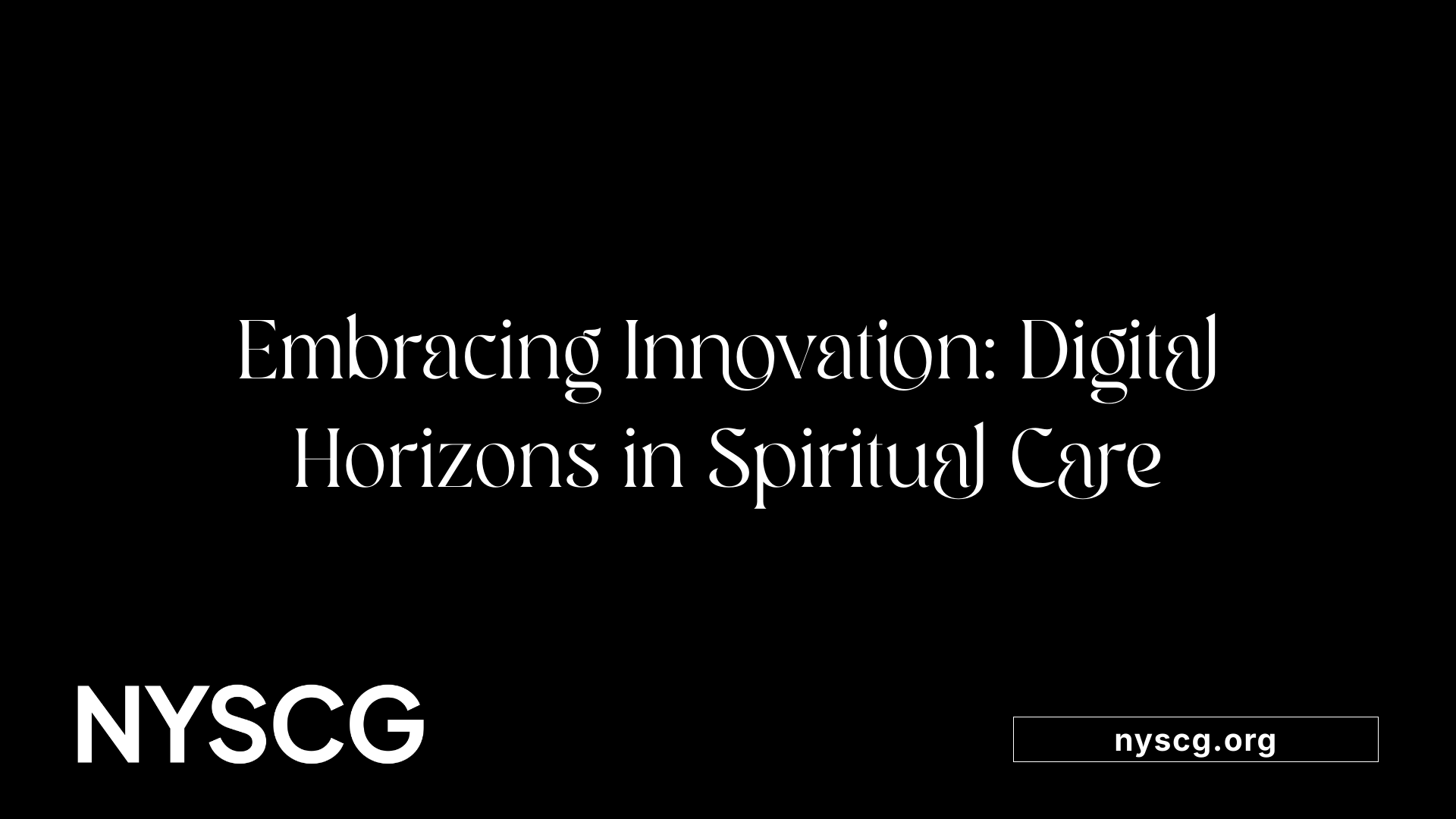Chaplaincy as a Side Vocation: Is It Sustainable?


In recent years, chaplaincy has expanded beyond traditional religious settings into secular institutions, healthcare environments, workplaces, and digital spaces. With evolving societal needs and increasing recognition of spiritual health as integral to overall well-being, many professionals are considering the viability of pursuing chaplaincy as a side vocation. This article examines the ethical, practical, and philosophical dimensions of chaplaincy, evaluating whether it can be sustainably developed as a secondary career amidst modern challenges.
Historically, chaplains have held roles rooted in religious traditions, offering spiritual care, moral guidance, and emotional support within specific faith communities. In settings like hospitals, military, and prisons, they provided religious services, prayer, and sacraments, often acting as intermediaries between faith and institutional environments.
Over time, especially after World War II, the perception of chaplains shifted from serving only specific religious groups to adopting a broader, more inclusive role. The focus moved toward a 'ministry of presence,' emphasizing compassionate support irrespective of religious affiliation or belief. This evolution allowed chaplains to serve people of any or no faith, in secular institutions like hospitals, universities, and workplaces, prioritizing holistic care over religious proselytizing.
Today, chaplains function as spiritual care specialists, cultural mediators, and sometimes, advocates for social justice. They work in healthcare, detention centers, military, educational institutions, corporations, and digital spaces. Their roles include conducting spiritual assessments, designing personalized care plans, engaging in interfaith dialogue, and providing crisis support.
SectorRoles and ResponsibilitiesAdditional DetailsHealthcareAddressing spiritual distress, facilitating meaning-making, supporting end-of-life careInterdisciplinary team member, often involved in patient advocacyMilitaryProviding moral guidance, supporting soldiers and veteransIncludes everyday support and crisis interventionEducationFostering inclusive, respectful environments, supporting students and staffUniversity chaplains foster religious literacy and intercultural understandingCorporateSupporting employee well-being, addressing workplace stressSome serve as corporate chaplains, offering confidential supportDigital PlatformsVirtual spiritual care, online community supportPivoted significantly during COVID-19 pandemic
Ethical practice in chaplaincy involves demonstrating honesty, integrity, respect, and compassion. Chaplains must avoid proselytizing or imposing beliefs, respecting diverse worldviews, including nonreligious perspectives. Confidentiality is paramount; they must maintain trust and recognize their professional limits, making referrals when necessary. Adherence to ethical standards set by professional organizations and continuous training ensures responsible conduct. Chaplains should also avoid diagnosing mental health issues or self-deploying to disasters, focusing instead on compassionate presence, cultural competence, and non-sectarian language in their service.

The future for individuals considering chaplaincy as a supplementary career option appears promising yet complex. As society increasingly recognizes the importance of spiritual care within secular, healthcare, and community settings, the demand for skilled chaplains continues to grow.
An aging population and cultural diversification further enhance the relevance of chaplains in providing holistic support. Many who have backgrounds in professions like healthcare, law, education, or social work find chaplaincy a meaningful extension of their work, especially as full-time traditional roles become scarcer.
However, pursuing chaplaincy as a side role involves significant challenges. Certification and training requirements are rigorous, often involving graduate theological education and supervised pastoral training, which demand considerable time and dedication.
The evolving expectations of chaplains include proficiency in ethical decision-making, crisis management, and interdisciplinary collaboration. Balancing these demands with other careers can be demanding.
Moreover, emerging fields such as Islamic chaplaincy or humanist chaplaincy face hurdles related to recognition, accreditation, and gender issues that impact their long-term stability.
Despite these hurdles, the expanding recognition of spiritual health's role within holistic care indicates a sustained growth trajectory for chaplaincy.
Professionals interested in this path should stay informed about certification standards, legal considerations, and the importance of ongoing education. Embracing adaptability and cultural competence will be essential for long-term success as a side vocation in the evolving landscape of spiritual and holistic care.

Eco-chaplaincy is an emerging approach within spiritual care that focuses on connecting humans more deeply with the earth and ecological communities. It can be understood as a place-based, community-anchored practice that tends to the spiritual health of both specific locales and their wider ecological systems.
This practice involves developing literacies about the places we inhabit, loving wounded or degraded environments, and cultivating a practice called Placefulness. Placefulness encourages attentiveness to current conditions and the arising ecological issues faced by local communities, fostering a sense of intimate care and responsibility.
Eco-chaplaincy is inclusive, serving people of any belief system or no faith who want to nurture a deeper bond with the earth or address ecological anxieties. It speaks to the spiritual dimension of ecological crises, offering comfort, meaning, and action-oriented guidance.
Institutions like the Center for Religion and Environment at Sewanee support eco-chaplaincy initiatives through educational programs and resources. These efforts prepare spiritual leaders to address environmental issues creatively and compassionately, integrating ecological concerns into their care practices.
Ultimately, eco-chaplaincy aims to foster a spiritual ethic that recognizes the interconnectedness of all life. It inspires communities to engage in ecological justice and sustainability efforts, emphasizing that caring for the earth is a vital spiritual act that supports human well-being and the health of all ecosystems.
Eco-chaplains advocate for ecological justice by addressing the moral and spiritual dimensions of environmental degradation. They support communities affected by ecological harm and promote practices that honor the sacredness of nature.
Through rituals, teachings, and community engagement, eco-chaplaincy encourages sustainable ways of living aligned with spiritual values of love, respect, and care for the earth. This approach encourages spiritual resilience and hope in the face of ongoing environmental crises.
By integrating ecological concerns with spiritual care, eco-chaplaincy expands the traditional role of chaplaincy—fostering moral reflection, community support, and active participation in environmental sustainability. It positions spiritual care as a transformative force for ecological justice, helping to inspire a collective movement towards a more sustainable and equitable future.

Many understand chaplaincy as responding to what is called the 'call of life itself.' This concept transcends specific religious doctrines and includes anyone seeking purpose, connection, or understanding following a profound experience or encounter with life's challenges. Whether rooted in faith or secular worldview, this response is fundamental to the spiritual process that guides individuals toward finding meaning in their experiences.
The process of making sense of life's call unfolds through three steps. The first is a pre-reflective sense of connectedness—an affective, instinctive feeling that links individuals to their environment and others. The second involves hermeneutical meaning attribution—interpreting experiences through reflection, language, and cognitive understanding. The third is the motivational response, which energizes participation and engagement in life based on the interpreted meaning.
Building upon this understanding, the Ritual Bath Model offers a structured pathway for spiritual care. It guides individuals through phases of approaching, deepening, connecting, and celebrating life experiences. At each step, the spiritual core enables chaplains to facilitate processes that foster deep engagement with personal and shared stories, supporting overall well-being. This model’s inclusive nature allows it to serve people of all backgrounds, affirming that responding to life's call is a universal aspect of human experience.
The necessity for chaplains continues to rise across multiple sectors due to increasingly frequent crises like natural disasters, community violence, and public emergencies. As societal participation in traditional religious communities diminishes, more individuals turn to secular institutions—such as hospitals, universities, and government agencies—for emotional and spiritual support.
Chaplains respond effectively to these needs by providing crisis intervention, mental health support, and a compassionate presence. They also help foster resilience and community cohesion during trauma. Moreover, organizations recognize that holistic care, which includes addressing spiritual and existential concerns, enhances recovery outcomes and overall well-being.
This expanding role of chaplains, especially in secular environments, underscores their importance in addressing complex human experiences beyond traditional religious settings. Their ability to support diverse populations through a broad understanding of meaning-making has made chaplaincy an increasingly vital service in today’s society.
Chaplains often face difficulties in defining their roles within institutions like hospitals and community organizations. They frequently navigate the delicate balance between being religious support providers and integrated members of healthcare teams. This can lead to tensions regarding their primary identity, responsibilities, and acceptance by other professionals.
Chaplains in healthcare serve as spiritual care specialists who address patients’ spiritual distress and unmet spiritual needs. They conduct spiritual assessments, work with patients and families to develop personalized care plans, and provide support through listening, prayer, or life review techniques. Their presence offers holistic support, which complements medical treatment and promotes overall well-being.
Spiritual assessments involve evaluating a patient’s spiritual beliefs, values, and needs to understand how these influence their health and decision-making. Following assessments, chaplains design tailored spiritual care plans that might include rituals, conversations, or spiritual reflections. These interventions aim to foster meaning, peace, and spiritual well-being during difficult health journeys.
Effective spiritual care requires close collaboration between chaplains and other healthcare professionals such as doctors, nurses, and social workers. Chaplains contribute as part of interdisciplinary teams, participating in bedside rounds, family meetings, and goal-of-care discussions. They help ensure that cultural and religious beliefs are respected and integrated into overall care strategies.
AspectDescriptionImpactRole of chaplainsProvide spiritual support, assessments, and care plansEnhances patient well-being and addresses holistic needsSpiritual assessmentsEvaluate spiritual needs and beliefsPersonalizes care and supports meaningful decision-makingTeam collaborationWork with healthcare professionalsEnsures integrated, respectful, and comprehensive care
Chaplains play an essential role in health settings by combining their expertise in spiritual care with medical processes. Despite challenges, their presence reinforces the importance of spiritual health as part of overall well-being in secular and healthcare environments.
The origins of government-sponsored chaplaincy in the United States trace back to the Revolutionary War, when chaplains served in military contexts and were later included in early prison reform efforts. The constitutional basis rests on the recognition that the government can employ chaplains to serve spiritual needs within public institutions.
Throughout history, courts have interpreted the First Amendment's Establishment Clause, shaping the boundaries of government-funded religious support. While initially allowing state chaplaincies aligned with specific denominations, legal interpretations have evolved toward supporting a more inclusive, secular model.
Legal decisions, such as Engel v. Vitale (1962), have reinforced the separation of church and state, influencing how chaplains operate within secular institutions. Courts have clarified that chaplains, especially in government settings, must serve in a manner that respects religious diversity and avoids endorsement of particular faiths.
Recent legislation has emphasized professionalism and accountability, fostering standards that chaplains must follow to maintain their roles within public sectors. These legal frameworks aim to balance religious support with constitutional principles, ensuring that chaplaincy services are inclusive and non-coercive.
Secularization has significantly transformed the landscape of institutional chaplaincy. As society shifts away from organized religion, chaplains are increasingly seen as spiritual care providers serving people of all faith backgrounds or none. This move towards inclusivity broadens the scope of chaplaincy, requiring cultural competence and sensitivity to pluralistic beliefs.
In secular settings like hospitals, universities, and workplaces, chaplains focus on supporting existential and emotional well-being without religious proselytizing. Their roles have expanded to include addressing mental health, social justice, and interfaith dialogue. Consequently, the profession is adapting to cultural and legal trends emphasizing neutrality and inclusivity.
AspectEvolutionImpact on PracticeRelated Legal and Ethical ConsiderationsHistorical RoleMilitary, prison, early state chaplainciesFocused on specific denominationsMust respect government neutralityLegal RulingsCourt decisions shaping secular boundariesIncreased regulation, standardsEmphasis on inclusive practicesSocietal TrendsRise of secularism, pluralismBroader client base, diverse needsEthical commitments to non-coercion
This ongoing transformation demonstrates the profession’s resilience and adaptability, ensuring that spiritual support remains relevant and respectful within an increasingly diverse and secular society.

The rise of digital technology has significantly transformed chaplaincy services, leading to the development of virtual and telechaplaincy practices. These innovations enable spiritual support to be provided through online platforms like Zoom, Skype, or dedicated apps, allowing chaplains to reach people regardless of their physical location.
During the COVID-19 pandemic, many chaplains pivoted quickly to digital platforms to maintain care continuity. This shift proved essential in hospitals, workplaces, universities, and community spaces, ensuring ongoing spiritual and emotional support amid restrictions on face-to-face contact.
Digital chaplaincy now includes dedicated virtual spiritual care, where chaplains can listen, pray, and offer companionship online. These services help individuals struggling with isolation, online anxiety, or difficulties communicating their needs in traditional settings.
Support via digital platforms is designed to be flexible and accessible. Chaplains often set appointments or are available on a drop-in basis to offer spiritual counsel. They engage in conversations about life, meaning, grief, or moral dilemmas, providing a compassionate presence that transcends physical boundaries.
In online communities—such as deconstruction groups or ex-vangelical movements—digital chaplains facilitate discussions, offer encouragement, and foster resilience. They help individuals navigate their spiritual journeys in a safe, non-judgmental environment.
A crucial aspect of authentic chaplaincy remains human empathy, which AI technology cannot replicate. Unlike AI chatbots or automated responses, digital chaplains bring genuine relationality, compassionate listening, and personalized spiritual care.
While AI can assist in providing information or basic support, the depth of emotional connection and spiritual attunement offered by human chaplains ensures that care remains meaningful and sensitive to individual needs.
As digital chaplaincy expands, ongoing training and ethical standards are necessary to maintain quality and integrity, emphasizing the irreplaceable value of human presence in spiritual care.
AspectTraditional ChaplaincyDigital ChaplaincyDifferenceSupport MediumFace-to-faceOnline platforms, video callsAccessibility and reachEmpathyHuman-drivenHuman interaction essentialRelational capacityCan AI replace?NoNoHuman relationality remains uniqueMain focusIn-person presenceRemote presenceAdaptation to environment
This evolution highlights how chaplains are embracing new tools to meet spiritual needs, ensuring that compassionate care remains accessible, relevant, and profoundly human in an increasingly digital world.
Chaplaincy presents promising opportunities as a long-term side career, especially given its expanding role across various secular and health care environments. As society becomes more culturally and spiritually diverse, the demand for compassionate, culturally competent spiritual care is growing. Among older populations and evolving healthcare models emphasizing holistic well-being, chaplains are increasingly recognized for their contribution to mental, emotional, and spiritual health.
However, pursuing chaplaincy alongside another profession comes with specific challenges. The training and certification process is rigorous, often requiring graduate-level theological study and supervised clinical training. Balancing these demanding requirements with other career obligations can be difficult.
Moreover, the evolving nature of chaplaincy roles—integrating ethical decision-making, crisis intervention, and interdisciplinary teamwork—necessitates ongoing professional development. Maintaining competence and relevance in multiple fields can be taxing but is essential for long-term sustainability.
In addition, emerging branches like Islamic chaplaincy encounter hurdles related to gaining formal accreditation and recognition. Gender-related issues and cultural sensitivities can further complicate integration into mainstream institutions.
Despite these challenges, the expanding recognition of spiritual care's importance across secular contexts suggests a robust future for chaplaincy. With strategic training, interdisciplinary collaboration, and cultural competence, chaplains can sustain their vital role as a meaningful side vocation for the long haul.
As the societal landscape continues to evolve, chaplaincy demonstrates remarkable adaptability and relevance, expanding into secular, healthcare, environmental, and digital domains. The profession’s capacity to meet diverse spiritual and emotional needs, grounded in strong ethical standards and ongoing professional development, underscores its potential for sustainability as a side vocation. However, practitioners must navigate challenges related to training, accreditation, institutional roles, and the delicate balance of religious neutrality and personal faith. By fostering inclusive practices and embracing innovation—such as ecological and telechaplaincy—chaplaincy can sustain its vital role in supporting human resilience in an increasingly complex world. The future of chaplaincy as a broader, accessible, and ethically grounded field suggests promising prospects for those committed to embodying compassionate presence across diverse contexts.
All you need is the will to make the world a better place.
New York State chaplain group inc. is a tax deductible organization with a federal tax Id number 92-383-4921